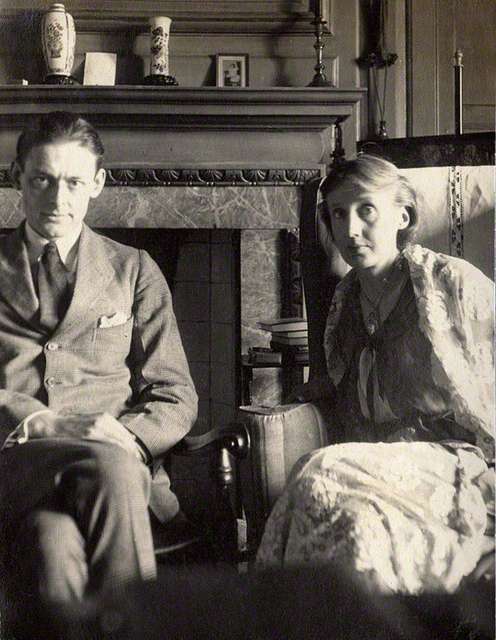“Across the nation and Europe, a misery compounded by the start, during the winter of 1921–22, of an influenza epidemic unlike any seen in Europe since the pandemic of 1918–19. It was not clear, as 1921 ended and as 1922 began, how much worse it would become.”
Bill Goldstein published these words almost five years ago in The World Broke in Two: Virginia Woolf, T.S. Eliot, D. H. Lawrence, E. M. Forster, and the Year That Changed Literature. The book investigates the state of mind of these four famous writers at the turn of 1922, exactly one hundred years ago. Will the world break again in two in 2022? Will literature also change? How different is our own state of mind, us common readers in un-enchanting times, from these literary giants?
I am not here to review books or to cook up a historical parallelism that may simmer better in a Youtuber’s channel. I have not yet finished Bill Goldstein’s wonderful history, for in reading it I felt the same urge that his writers did a century ago: pick up a pen – gosh, I mean my dull laptop – and wish to express in words what our historical moment would want us to translate in kicks and blows. I am sure it is the same for all of us, literary or not – as 2022 looms around the corner, we all feel the need to mark a break somewhere, the need to move past a haunting period and the desire to start something anew.
Yet if we could learn one thing from the events not of 2022 but 1922, it would be that perhaps it is far wiser not to break the world in two this time around. What Woolf, Eliot, Lawrence and Forster were struggling with in 1922, according to Bill Goldstein, was not a matter of mere mood swings, nervous breakdowns or even the epidemic itself, but the invention of modernism. The whole literary landscape had changed, especially after the blazing publication of Marcel Proust’s In Search of Lost Time. Lost time! Do we not ourselves feel we have lost so much time?
I insist on the word ‘feel’ – for it is after all a mere feeling, to lose time. The same goes to the world breaking in two, or the world changing, or the world ending, as we have been dwelling on since March 2020. It is not that nothing changes – but that in our firm belief that things have changed, we change them twice.
Woolf, Eliot, Lawrence, Forster – they are excellent writers who sensed the tide turning, but there is a dose of despair in their writings that is more the product of ‘their time’ than that of lost time; a despair that we ourselves now carry. For the invention of the modern is not a one-time event – 1492, 1789, 1871, 1968, we have plenty of them – rather it is the mark of a renewal, a passing from a wretched period to a more promising and modern one.
I am neither particularly pessimistic nor very optimistic to claim that 2022 shall enter that hall of fame for changing years, that it shall bring catastrophe and genius all at once. But I share Mark Twain’s opinion that while history doesn’t repeat itself it certainly rhymes. And if the 1920s were a period of great literary renewal, it was also the rise of the mob, and the knives of the hooligans. These two – the artists and the hooligans – are after all the two sides of the same coin, and I dare say that likewise, if the past ten years have seen a rise of nationalism, those who voted for the extreme-right were merely the ones who were the first to catch the foul smell of a rotten age. Populists, sometimes, are the reluctant poets who, deprived of the pen, resort to screaming.
The blame of the later catastrophe that ensued from 1922 – in WW2, and the Holocaust – is not merely on the backs of the vulgar, but also those geniuses whose attempts to stop things had come too late. I am always shocked whenever I read the lack of urgency in the correspondences of literary greats in the late 1930s. There was no sense of urgency because these writers were indeed in search of lost time – that is, they stood outside of time, outside of the parameters of the present in which urgency could be legislated. Who is left in the present? Those working for a righteous cause. And I mean all the wrong causes – for the sake of some nation, some god, or some property on the Moon.
That is the chief reason why evil strikes more quickly than good. It has something to do with time, and our relationship with history. The good guys, somehow, always end up standing outside of history; feeling rootless in society; though often rightly so. The bad guys, them, spend that time working to make history; galvinizing the attention of society. The reason for the disparity is simple: it is harder to build than to destroy; because one can destroy something with his own hands, whereas building requires a firm confidence that man, though fabricating for humanity on his own, is never alone.
And in 2022, we need to build things. Enough bringing down towers. Otherwise we are doomed to be taken with the flowing current of the modern – and it is often a waterfall. The world should not break in two next year; that is, we must keep at all cost a common world in which none of us would have to sink to an “inner immigration” as Hannah Arendt warned in Origins of Totalitarianism; that foolishly-intellectualised form of isolation among the European inteligentsia that facilitated the Nazi takeover.
Let us be weary of the words of D.H. Lawrence himself: “I was so weary of this world, / I was so sick of it, / everything was tainted with myself, / skies, trees, flowers, birds, water, / people, houses, streets, vehicles, machines, / nations, armies, war, peace-talking, / work, recreation, governing, anarchy, / it was all tainted with myself.”
One would like to shake Lawrence and reply, “then get over yourself!” Meaning: the world is not yours, but for all of us; and all you can do is help us build it. May 2022 be the year the world finally stays one and the same; not the same in the guise of a conservative, but radically the same, as it always has been; a world in which the only people we believe in are our friends, and the only country we serve is the planet we live on.


